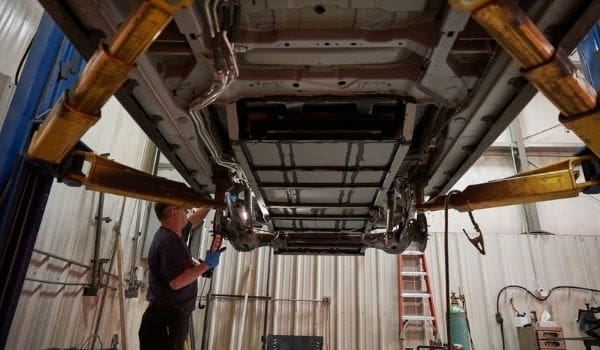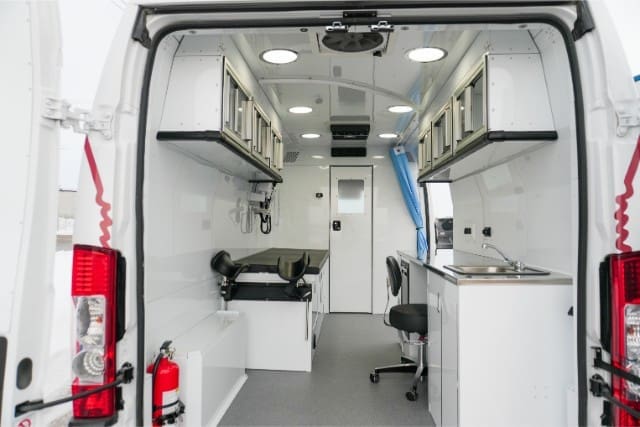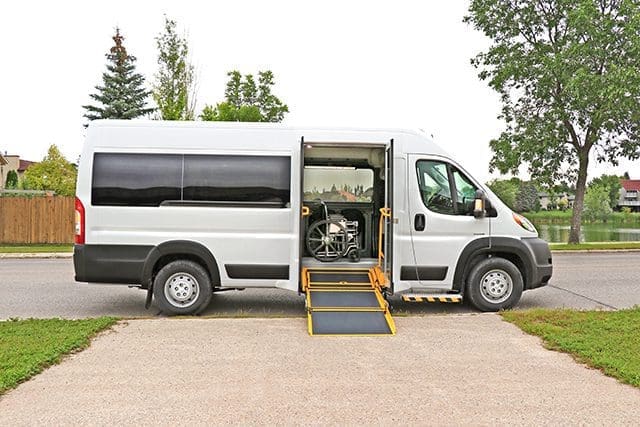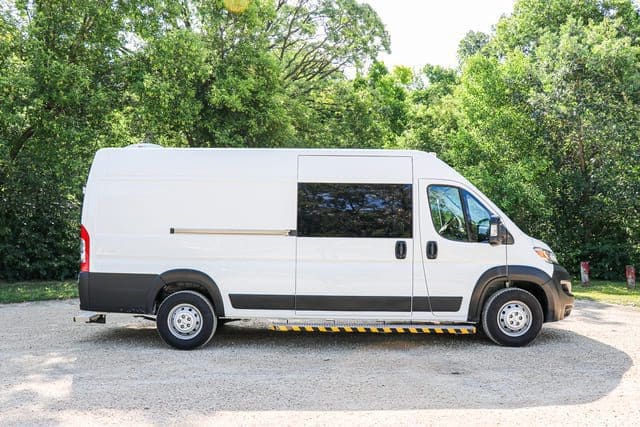“Which is better: repairing or replacing my wheelchair van?”
We get asked this question a lot at MoveMobility, and it’s a difficult one to answer. It’s not black and white, but simply answering “it depends” just won’t do.
Because a wheelchair van is more than just a wheelchair van–it’s an investment, and not a cheap one. You lose money if you repair your van when it should be replaced. You lose money if you replace your van when it could have been repaired.
That’s why in this article, you’ll learn the differences between repairing and replacing your van, the pros and cons of each option, and three questions you can ask yourself to help you decide.
Ultimately, you’ll learn which option is best for your organization.
At MoveMobility, we repair and manufacture new wheelchair vehicles. As we’re sure you’ve guessed, the second option makes us more money, but we promise to give you the unbiased truth in this article.
That is, sometimes repairing is better, and sometimes replacing is better. It all depends on your organization and the state of your van.
Repairing or replacing your wheelchair van: what are the differences?
Two major differences should be considered when deciding whether your organization should repair or replace its van: cost and time.
Replacing your van will likely be more expensive
Cost is probably one of the major differences between repairing or replacing your wheelchair van, but it varies.
Here are a few situational examples:
If your entire engine needs to be replaced, you might as well replace your van, considering the cost.
Or, if only a small part of your engine needs to be replaced, then you should repair that piece.
I’ve said it before and I’ll say it again: this question is not black and white.
You have to take a look at your own circumstances–what isn’t working in your organization’s van, what your organization’s current financial situation is, etc–to discover which option is right for you.
If you want to know what a wheelchair van costs from MoveMobility, check out this article.
Replacing your van may take more time
Time is another major difference between repairing and replacing your wheelchair van.
Repairing your van will likely take less time than converting it from top to bottom (learn more about our timelines here). But this is not a hard and fast rule–again, it depends on what you need to have repaired.
Pros of repairing your wheelchair van
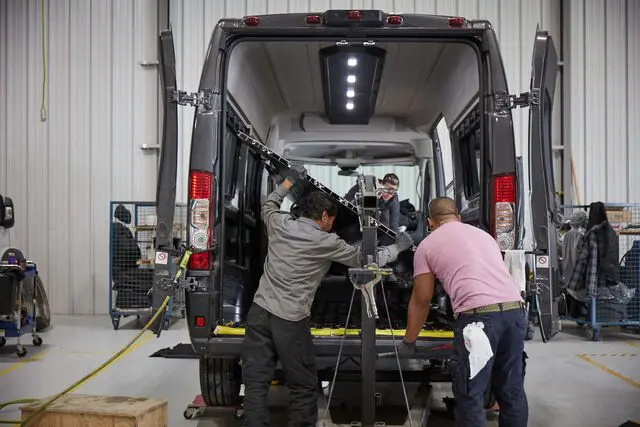
Can be less expensive
Repairing your wheelchair van can be less expensive, but notice my use of wording here. It can–it’s not a guarantee that it will.
It depends on what you need fixed. A small issue with the engine? No problem. But does the entire engine need to be replaced? If so, get your wallet ready.
Can take less time
Again, it depends on what repairs you need, but it will most likely take less time to have your wheelchair van repaired than to get a whole new one.
This is great if you’re in an emergency situation and you need your turnaround time to be quick and efficient.
Pros of replacing your wheelchair van
Your new van will be reliable
When you replace your wheelchair van, you get all the security and reliability that comes with something new.
Your new van will have updated conversions and safety features
Replacing your wheelchair van means you get all the new vans’ updated conversions. This can include more reliable ramps/lifts, sliding doors, new safety features, etc.
You also get to have all the new safety features that come along with it. This can be features like backup cameras, parking sensors, etc.
Cons of repairing your wheelchair van
Older wheelchair vans may not be as reliable as new ones
When you decide to repair your wheelchair van instead of replacing it, you’re signing on to the fact that you will not get the reliability of a new wheelchair van.
This means you will not have the updated conversions or safety features, and your van has not progressed in the wheelchair van manufacturing world.
As a result, your van may not be as reliable as the new wheelchair vans.
It can cost the same as replacing in the long run
A common misconception wheelchair van owners have is that repairing their vans is less expensive. But this isn’t always the case.
Over time, the cost of repairs adds up, and you can spend the same amount of money repairing the old van that you could have used on a new one.
One of the most common complaints our Customer Care team receives is about the cost of repairing an old van.
Your organization needs to decide whether the repair will be a long-term fix. If you’ll have to keep getting repairs done, this is when it may make more sense to just buy a new van.
Repair parts may be hard to find
How old is your wheelchair van?
This is an excellent question to determine how complicated the repair parts will be to find and, thus, how expensive they will be. Sometimes, repair parts aren’t available at all.
Your van may have outdated conversions and safety features
When you repair your wheelchair van, you won’t get our new van’s updated conversions and safety features.
These could include sliding doors, backup cameras, parking sensors, etc., which are all very helpful when driving a large vehicle.
Cons of replacing your wheelchair van
You will have to go through the process of buying a new van
If you choose to replace your wheelchair van, you will have to go through the process of purchasing the vehicle again.
We do our best at MoveMobility to make that process as efficient as possible, but it will still take time. Check out this article to learn how long it will take to get a new van.
Repairing vs. replacing your wheelchair van (3 questions to ask)
There are three major questions you should ask yourself when trying to decide which option is right for you.
1. What is your current van’s mileage?
If your van’s mileage is above 100,000 kilometers, we suggest replacing it because once you surpass the 100,000-kilometer mark, your van will already have a lot of wear and tear.
However, if your van is significantly below 100,000 kilometers, we suggest repairing your van (given that the cost of repairs doesn’t come close to the cost of a new van).
2. What repairs do you need?
What’s wrong with your vehicle? Is more than one thing breaking down? Do you need to replace your engine?
Knowing all the repairs you need before making this decision is important.
This is because if you need to replace your entire engine, a new manual ramp, or your sliding doors aren’t working properly, all of these repairs will cost you about the same amount as a new wheelchair van.
3. What are your roads like where you live?
If you live in a remote location with rough winter roads, we suggest a new wheelchair van if there’s an issue with your current one.
This is because even if we fix whatever’s wrong with your van, rough winter roads will break it within a short amount of time. So, if you live in a remote location with rough winter roads, you should likely replace your van.
Repairing vs. replacing your wheelchair van: your next steps
You came to this article to learn if repairing or replacing your wheelchair van is the right choice for your organization.
Now, you know the differences between repairing and replacing, the pros and cons of each option, and three questions you can ask yourself to help you along your decision-making process.
Like I said before, at MoveMobility, we do repairs and we also manufacture new wheelchair vehicles. So, if you’re curious to learn more about repairing/replacing your van, talk to a MoveMobility expert now.
Or, continue on your research journey and read these related articles:


